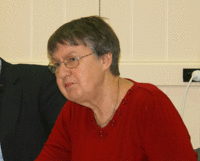Cecily McNeill
10 June 2011
The government’s latest budget has dealt a blow to families with children by failing to address a growing gulf between low-income families and those on a benefit.
 Wellington economist Anne Else told a budget breakfast in Wellington on May 20 that the budget held good news for children with rheumatic fever, a disease of poverty, in the $12 million over four years that will go into boosting frontline community staff, school-based sore throat clinics and training programmes for health professionals and community workers.
Wellington economist Anne Else told a budget breakfast in Wellington on May 20 that the budget held good news for children with rheumatic fever, a disease of poverty, in the $12 million over four years that will go into boosting frontline community staff, school-based sore throat clinics and training programmes for health professionals and community workers.
‘But rheumatic fever is caused primarily by cold, damp, overcrowded housing. And living in this kind of housing is not a lifestyle choice. It is caused by poverty. What is there in this Budget that will help to lower child poverty?
‘Beneficiary families with children are by far the most likely group to be suffering hardship. This seems to be now taken for granted. The Budget says nothing about this pool of poverty, or about these children.’
Hardship is defined as earning below 60 percent of median household income after housing costs. Ms Else says hardship rates for sole parent families were around four times those of two-parent families and by 2009 nearly half of all children living in poverty were in one-parent households, more than double the percentage in 1988.
‘Working for Families seems to have concentrated poverty in beneficiary and especially one-parent households. Beneficiary families with dependent children had hardship rates around five times those of working families with children (50% vs 11%).
‘The Minister of Finance says this Budget is about building our future. That is certainly true in one unfortunate sense. Overall, this Budget will help inequality and poverty to grow, with all the misery, injustice and, ultimately, huge cost to the whole society that will bring.’
Meanwhile, Professor of Demography at the National Institute for Demographic and Economic Analysis, Natalie Jackson warns that in just 12 years there will be more elderly than children in New Zealand.
Ms Jackson told a Budget Breakfast in Hamilton on May 23 that Baby Boomers were secure as children because they were invested in. They mostly had two parents who were supported by the State, with full employment policies, child allowance and state housing as a path to ownership. They also had school milk. ‘We invested in them.’
Today’s children need to be recognised as the critical platform for New Zealand’s future and they need for their parents (sole or otherwise) to be invested in as deeply as their grandparents.